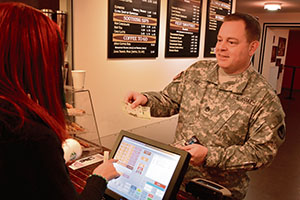Story and photo by Rick Scavetta
U.S. Army Garrison Kaiserslautern Public Affairs

When Staff Sgt. Joe Kibe recently vacationed with his family in Spain, his mind rested easy knowing his finances were in order.
That wasn’t the case a year or so ago, before Army resources helped him tackle debts.
Kibe, an NCO with the 903rd Contingency Contracting Command, owed roughly $50,000 when he moved to the KMC in mid-2011. He and his wife, Amy, saw an advertisement for Army Community Service financial readiness classes.
“It can’t hurt to check out ways the Army offers — for free — opportunities to learn how to provide yourself a future,” Kibe said. “We said, ‘Let’s check that out.’”
Each year in late February, during Military Saves week, ACS holds events and seminars to promote financial readiness, said Denise Fesel, who manages the ACS financial readiness program. The week of events reminds troops and their families to get back on the savings path, she said.
“We get caught up in the day. Sometimes we forget,” Fesel said. “It’s like riding a bicycle. You fall off. You might need to be reminded to get back on.”
A former Marine, Kibe, 43, of Mechanicsburg, Pa., worked for FedEx as an independent contractor delivering packages, which earned him a nearly six figure salary — good money, but that’s where the financial problems began.
“You start making money and you think you can live on a higher level,” Kibe said. “You start running the credit cards up, going on vacations, buying a house and buying cars. Your debt to income ratio gets a little out of hand.”
He joined the Pennsylvania National Guard for extra money, became a finance Soldier and, in 2006, volunteered for an Iraq deployment. Around then, the Kibes took out a $8,000 loan from a mailed convenience check. That grew as high as $19,000.
“That loan turned into a monster. It was a fallback to keep us afloat,” Kibe said. “The percent was so high that every payment went to the interest and late fees. It just kept going up.”
A $15,000 tax-free re-enlistment bonus, while serving as a finance NCO at Balad Air Base, wasn’t enough for them to get caught up. After his Iraq tour, Kibe decided to stay on active duty. A recruiter offered him $20,000 to leave immediately for Korea.
That meant another year away from family, but they were trying to stay afloat, Kibe said. His next tour, at Fort Drum, N.Y., included housing — but less money. His house in Pennsylvania was in jeopardy. He had to work a deal with his bank to sell. Hoping for better promotion potential, Kibe reclassified for a new Army job in contracting.
Then he got orders for Germany, moving there with Amy and daughter, Kaylie, 10. His son, Mark, 19, lives stateside. Finances remained a challenge. In fact, he owed roughly $50,000, including payments on a truck and various credit cards and loans. He’d pay minimums on bills, sometimes less, Kibe admits.
“We didn’t have a budget,” Kibe said. “We were just living paycheck to paycheck.”
Significant debt affects you mentally and physically, Kibe said, adding how poor sleep, bad eating habits and stress made matters worse.
“That never leaves your mind, whether you’re trying to sleep or at work,” Kibe said. “Those things eat at you.”
Kibe enrolled in Financial Peace University, a 12-week DVD-based course where Dave Ramsey, a faith-based financial expert and motivational speaker, shared ideas on how to dump debt. The program, held at Daenner Kaserne, is run by U.S. Army Garrison Kaiserslautern’s Religious Support Office.
The Kibes have since turned things around. They went from 12 bills a year and a half ago, down to just two now. In early February, Kibe took his family to Spain. They rented a car, visited the Rock of Gibraltar, and didn’t worry about bills.
“We took the Dave Ramsey information and did the budget and figured everything out,” Kibe said. “The program helped us jumpstart how we were going to handle our finances.”
Soldiers and family members can access a variety of free financial readiness classes offered through ACS, Fesel said. She regularly sees Soldiers and their families in similar situations as the Kibes.
“Theirs is a classic case. I’m just happy that they took that first step,” Fesel said. “To watch them continue now, I know they are going to succeed.”


